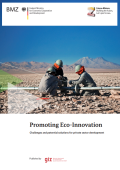In a continent that is starved for energy and infrastructure, it is an enigma that India’s markets for energy efficiency have yet to take off. The authors of the report spent several months researching and debating this issue with stakeholders in India and around the world.
This white paper seeks to define the concept of a green economy within the economic, social, and environmental realities of the country. The paper's overall objective is to advance the state of knowledge in Canada on green economy concepts and practices, and to serve as a reference document for further engagement and dialogue.
More specifically, the paper addresses the following questions:
- How does a definition of the green economy in Canada balance the reality of continuing economic growth, particularly in the resource sector, with evidence of local and global environmental impacts and thresholds?
- Which indicators can provide information on Canada's progress at a macro-economic, sectoral, and firm level?
- What gaps exist in the knowledge and understanding of the green economy in Canada, particularly in terms of data and analysis?
- How can the Canadian economy become more innovative and competitive in the context of global resource scarcity, climate change, and emerging clean technologies?
This report is the results of joint research by a team from the World Bank and the Development Research Center of China’s State Council which was established to address the challenges and opportunities of urbanization in China and to help China forge a new model of urbanization. The report takes as its point of departure the conviction that China's urbanization can become more efficient, inclusive, and sustainable. However, it stresses that achieving this vision will require strong support from both government and the markets for policy reforms in a number of area.

This paper, Promoting Eco-Innovation: Challenges and potential solutions for private sector development, begins with an exploration, in Chapter 1, of how eco-innovation is addressed in the current international debate. This refers mainly to the climate change negotiations and the recent Rio+20 conference. Chapter 2 then provides a working definition of eco-innovation and examines how it fits with the requirements of private sector development. Chapter 3 contains an overview of the general conditions under which eco-innovations are generated in developing countries, including both the supply side and the demand side. Chapter 4 discusses possible approaches in the context of German development cooperation, and asks which instruments can be used to foster new innovations and encourage their rapid dissemination.
The report includes case studies on the African continent, Egypt, Ethiopia, Germany, and India.
The latest edition of this annual report outlines the latest developments, signs and signals in the financing of renewable power and fuels. Full of statistics, charts and narrative, it explores the issues affecting each type of investment, technology, and region. Overall the report underlines the increasingly positive role renewable energies are playing towards an increasingly low-carbon electricity and power supply.
The report includes case studies from China, India, and Brazil.
